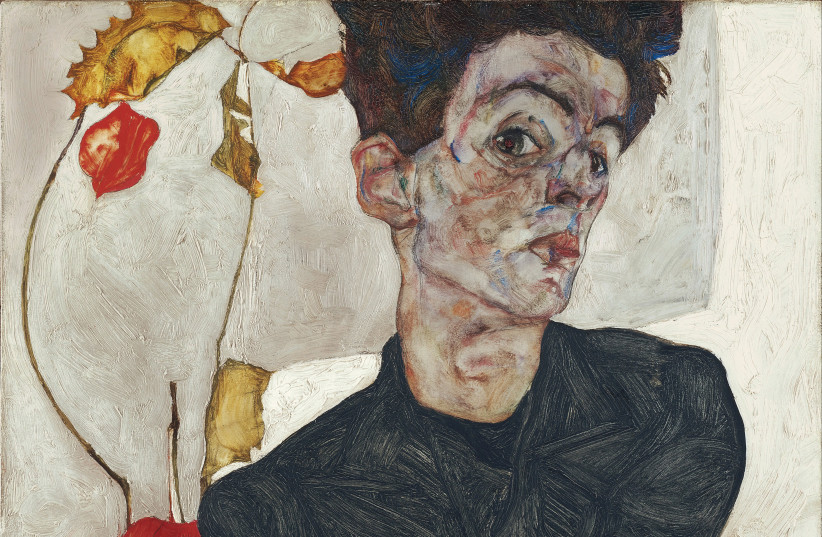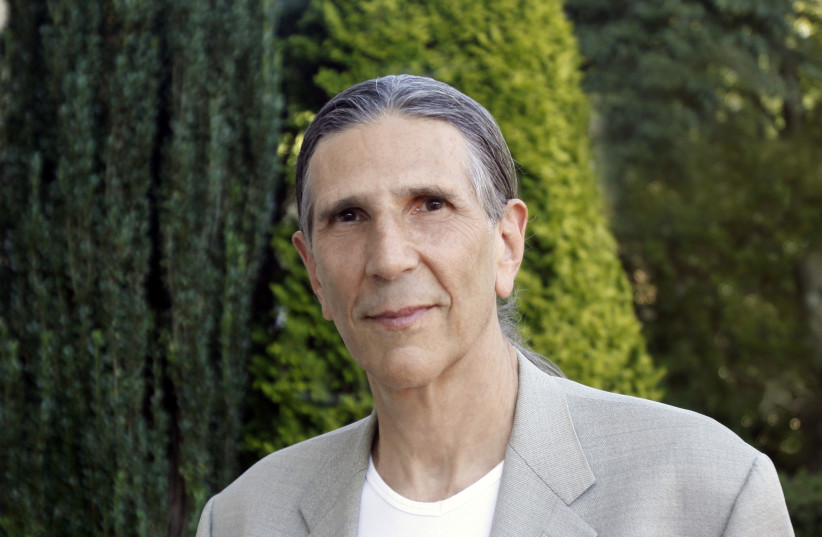Having reviewed one of Richard Michelson’s earlier books of poetry, Battles and Lullabies, in 2006, I was excited to experience his work’s evolution. I picked up Sleeping as Fast as I Can and couldn’t put it down. When I finished, mesmerized, I read it all over again.
I had met the poet – owner of the R. Michelson Galleries in Northampton, Massachusetts, and close friend of the late actor Leonard Nimoy (aka Mr. Spock) – by phone a couple of years previously when I interviewed him about Nimoy’s fascinating book of photographs, Shekhina Project. As in Shekhina, in Sleeping as Fast as I Can there is a masterful blending of prayer and profanity as there is of old world and hi-tech, factual history and “fake news.”
Michelson has a profound grasp of Jewish history, of antisemitism and pogroms, of moral teachings and midrash, of sinners and prophets. He explores the connections between history and memory and the boundaries between the personal and the political. His poem “Fake News” contrasts social media “truths” with the blood libels against Jews reflected in Chaucer’s Canterbury Tales and in 12th-century reports of Jews flavoring matzah with Christian blood.
The poet (who has also written librettos) wraps together high diction and common vernacular and sets them within the measure and music of poetry, making full use of his toolbox of sonnets, sestinas, ghazels, rhymed couplets, and strict meters. And yet, somehow, all this formality blends into the background as one becomes magically engaged in a casual conversation of the gravest consequence, concerning the deepest philosophical questions on finding joy, and love, and God in a world filled with suffering and pain.
In cinematic style, he intertwines long shots and close-ups, crosscuts and jump cuts, reverse angles and deep focus. He changes speakers, time frames, tones, and themes mid-sentence, and yet manages to make it historically relevant and contemporary in feel.

In his poem “Meditation after Casting My Sins upon the Waters,” he writes, “…I Will Create as I Speak/ the Lord once saith, in Aramaic no less – Avra Kahdabra –/distracting us with cape and hat and that sly, cunning grin./O how I envied His deep voice and gift for misdirection./And now my astonishment at this morning’s small miracle/when, up early and stumbling at the shore, I saw, as I fell/face down into the shallows, my sins swimming about me/like a school of minnows, no, I mean like my own fingers,/all ten of them, intertwining into a gesture of prayer.”
Kafka, Einstein, Moses, and Rembrandt populate Michelson’s poems and interact with each other as if they all had one foot in the biblical era and the other in racially polarized, poverty-stricken Brooklyn.
Brooklyn is the neighborhood where Michelson’s father was murdered – a victim of gun violence – and where his mother descended into dementia. Many of the poems pay tribute to his parents, honoring them and restoring their dignity.
In “Neighborhood Villanelle,” he writes, “In this neighborhood you’d better learn to fight,/my father says. Real schooling’s from hard knocks./Books won’t save your life. He knows I’d rather write/and read. I don’t talk back. His love is no birthright./Instead, I bluff, act tough. He teaches me to box./In this neighborhood you’d better learn to fight,/he says, or you’ll be prey; better tough Israelite/than studious Black Hat, defenseless Orthodox...,” ending the poem with “The paradox:/a bullet stopped his life; lead plug he could not fight./I escape the neighborhood with every word I write.”
And in “Unveiling”: “When my mother’s muscle/stopped beating, moments after I gave the surgical center/my written nonintervention permission, I became aware/for the first time of the warren of my body, its escape routes/ and artificial enclosures. No soul but soil my mother taught/and it stuck; afterlife of neither God nor prayer, but pebble-/mud-dirt. And yet, one year to the day, my sister and I gather/graveside to recite, transliterated, the Mourner’s Kaddish/after divesting the monument of its covering cloth. Ritual/complete we fold into vehicles, two emergency-medical-/cooler-torsos transporting home our holy, temporary hearts.”
In a Kafkaesque exercise in time travel, alternately delighting and horrifying, Michelson unites Einstein, Mozart, Trump, and Kafka himself into a single sestina that traces how the Spanish flu, relativity, COVID-19, and art have altered history. Did you know who got the place Hitler had coveted at the Vienna School of Art? Did you know the history behind the last paintings of Egon Schiele, who died so young? One is forced to contemplate what would have been if Schiele had not been accepted into the academy. Might the Holocaust have been avoided?
About Schiele “…Ready/now to sketch himself dying, he gazes into the small square/of his shaving mirror, and recalls how he first entered the/Vienna Academy of Fine Arts at age sixteen, even before/his initial shave, no younger student accepted before/or since. He died, never to know he’d won that spot over/the seventeen-year-old Adolph Hitler, who’d later loathe/”degenerate art” and “physicist Jews,” moving to Berlin/to pursue politics, aborting both brush and pen,” Michelson writes in “Vermin.”
AND YET, the book is as full of humor as it is of heartbreak, often within the same poem. His poems “stand in the tradition of the Jewish spiritual comedian,” writes T.S. Eliot Prize-winning poet Mark Doty. His work is “philosophical, political, tender, outraged, and funny as hell,” comments National Book Award-winning poet Martin Espada.
The title itself, Sleeping as Fast as I Can, is based on an old Yiddish folk saying, “Sleep faster, we need the pillows.” This not only evokes the conundrum of resourcefulness and poverty but also serves as an epigraph for the book, along with quotes from Israeli poet Yehuda Amichai (whose words have also supplied the epigraph for each of Michelson’s previous books).
He pivots to an old Jewish joke. “Will poetry save us? If cultured individuals are not more likely to be kind, why do I find solace in art? I am reminded of the old joke: ‘What is the difference between a Jewish optimist and a Jewish pessimist? The pessimist thinks things can’t get any worse, and the optimist says: ‘Yes, they can.’”
In his poetry, Michelson identifies as an optimist: “We would not put words to paper if we didn’t hope they had meaning for others, and that a future exists where they might survive. In that sense artists are often the most optimistic of people.... There is a pleasure we get from the well-crafted poem, even if it is talking about a death in the family, or mass murder.”
New York State Poet Laureate Patricia Spears Jones calls Sleeping as Fast as I Can “prayers, rants, memoria, and rage against hatred, violence, racism, and antisemitism in a bitches brew of language on every page.”
There is rage in Michelson’s poems, but never bitterness.
“Let me fold my mother’s/frail and failing body into the sheets of this too narrow cot/as carefully as rage nestled deep inside of her encouragement./The puzzles you fed me, mother, are still my nourishment,” he writes in “I Create as I Speak.”
Poems more relevant than ever post-October 7 massacre
TODAY TRAGICALLY, these poems are even more relevant than the poet could have imagined when he wrote them, pre-October 7.

While an adamant supporter of Israel, Michelson recognizes that suffering does not belong to the Jews alone. The book’s opening poem, “Prayer,” laments: “…another Black motorist/murdered live on YouTube (shared, copied, spread virally),/tomorrow an Asian, Tuesday a Jew.”
In “Life Sentence,” he recalls how his grandfather defines him a “Holocaust Jew”: “My identity defined by the negative; not passion, not mystery,/not awe before the great unknown, but the burden of history/and fear…/What is hateful to you, do not do unto others – a text for every age./But too soon the flame is mute; my mind again consumed by rage.”
It is this foundation that makes his ultimately life-affirming emphasis on the worth of each individual and his personal spiritual struggle so honest.
Palestinian-American poet Naomi Shihab Nye praises Michelson’s poetry, calling it “dazzling smart, tender and original... as he mixes the angels and devils of history and hope into realms of greater beings.”
“I am deeply moved by Michelson’s poetry,” Elie Wiesel wrote in a review of the poet’s first book, Tap Dancing for the Relatives, over 40 years ago. “May his poems be shared with many more readers.”
Michelson’s is an indispensable Jewish voice in this generation.
- SLEEPING AS FAST AS I CAN: POEMS
- By Richard Michelson
- Slant Books
- 106 pages; $17
www.RichardMichelson.com is the link to the author's website.
